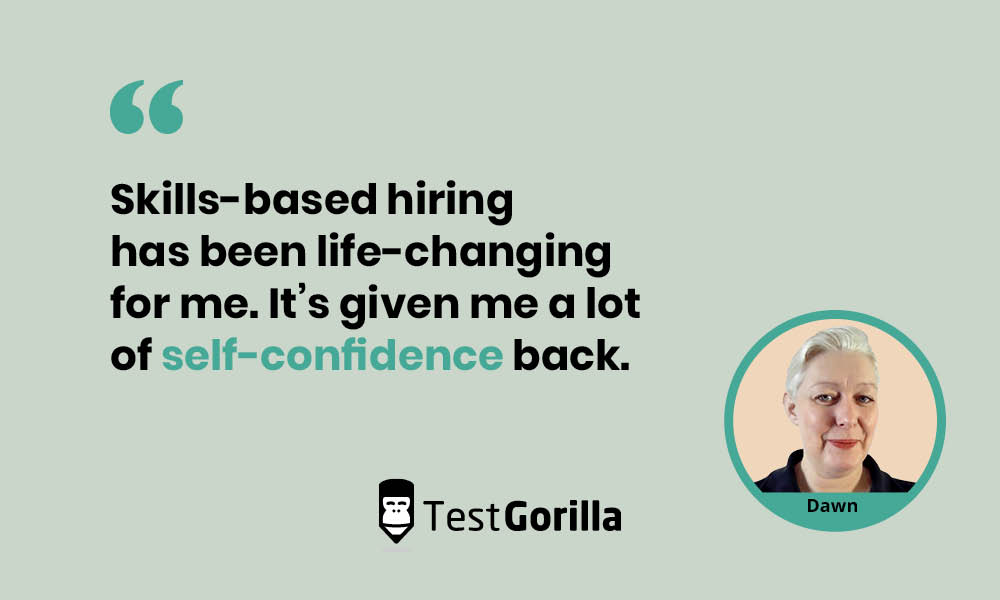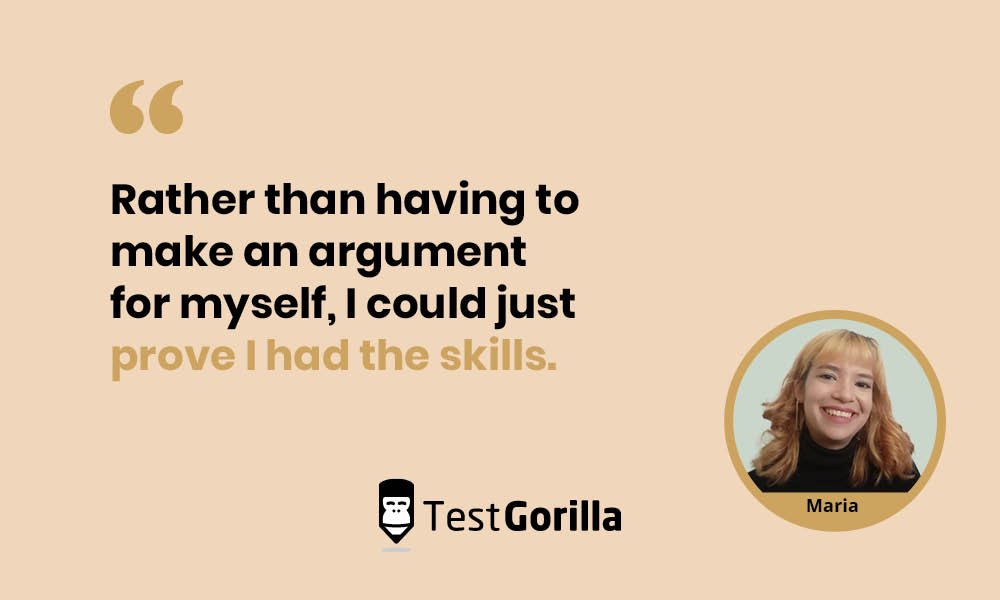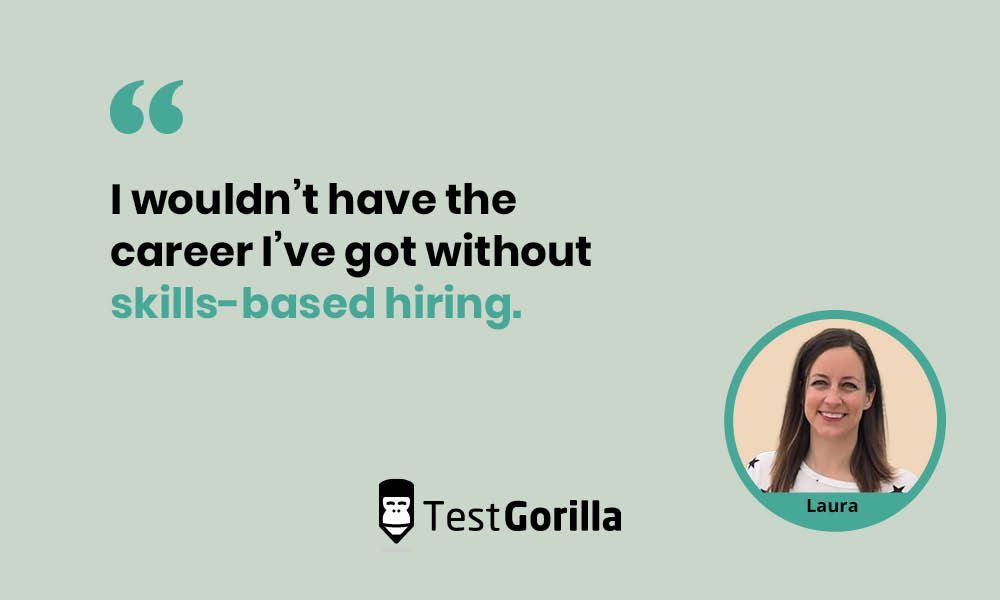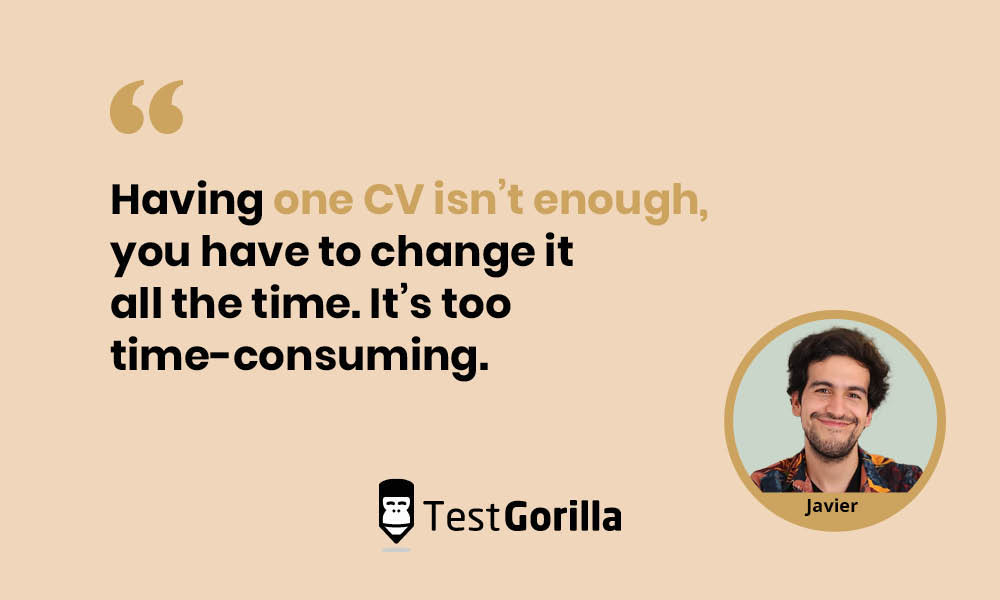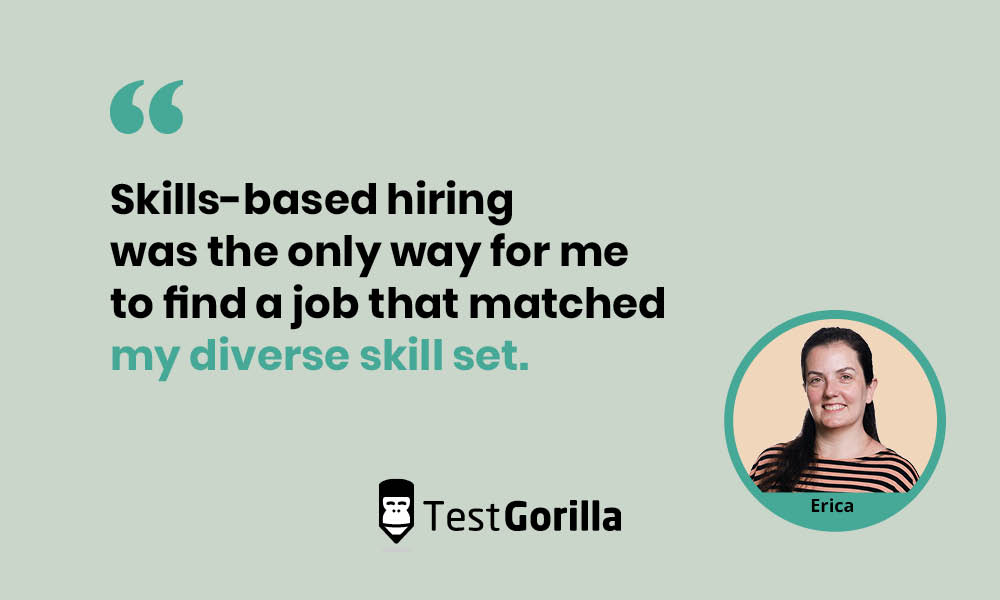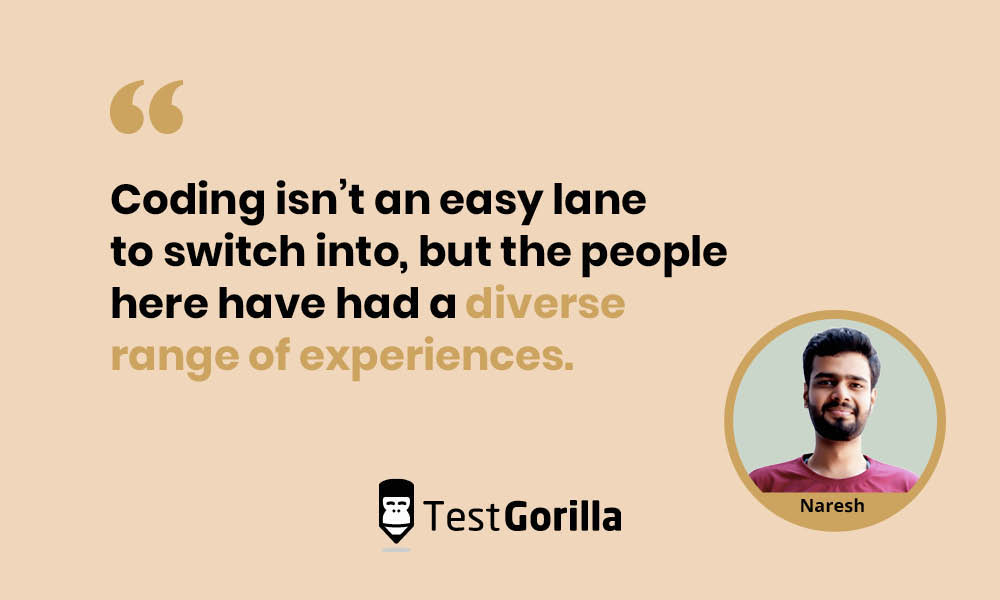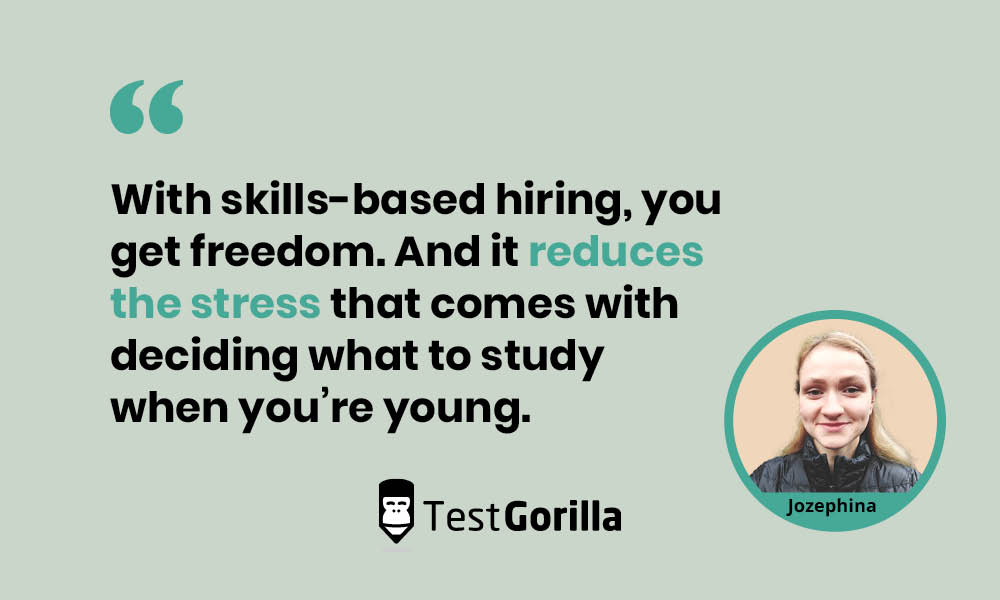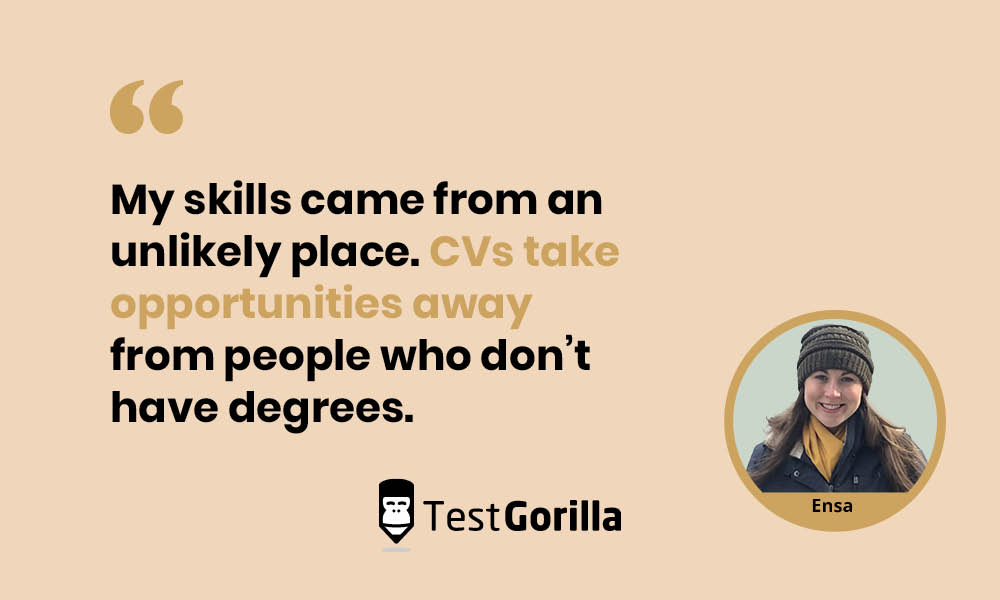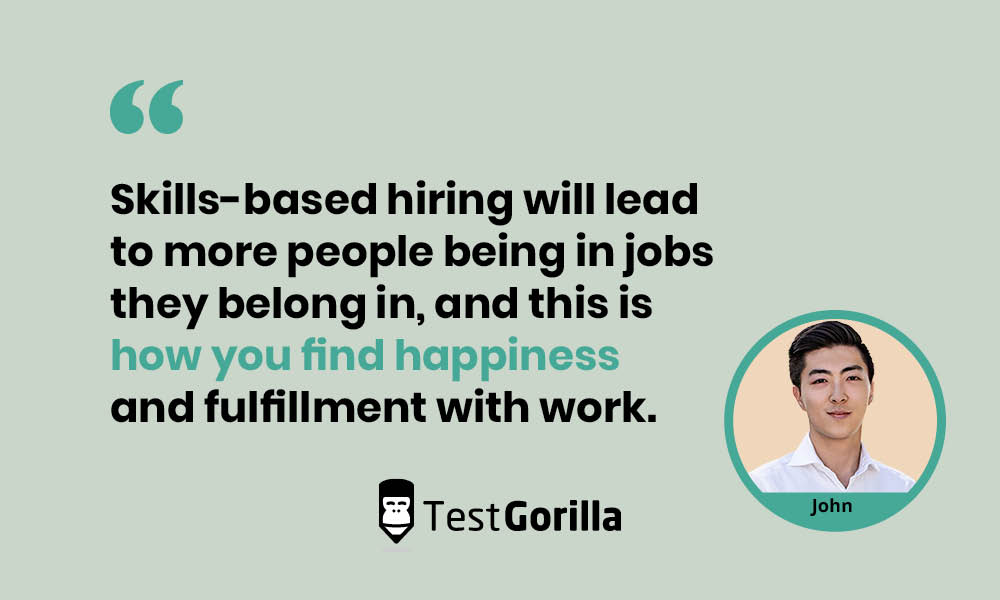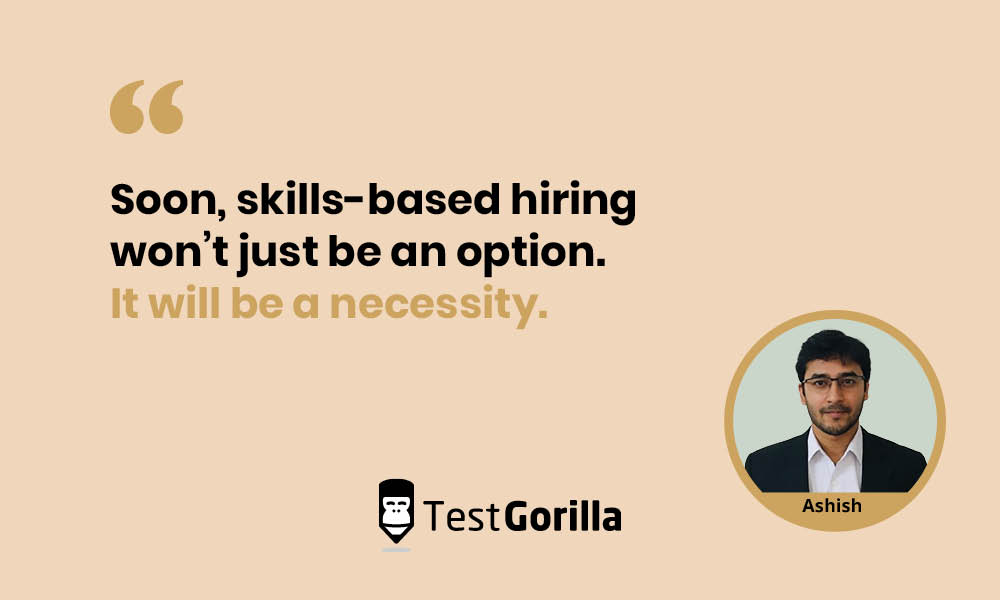10 inspiring skills-based recruitment stories
The world of work is changing, and it’s becoming increasingly clear that we need a new way to recruit. Our goal at TestGorilla is to lead and nurture a shift from CV-based to skills-based hiring, where the recruitment process focuses on what candidates can do rather than what they’ve done in the past.
We practice what we preach, so every one of our people has been recruited for their skills, using a TestGorilla assessment. And based on their experiences, we know that skills-based hiring has the power to change lives.
To share some of that power, we asked 10 team members to talk about their careers before TestGorilla, and their experiences with both resume-based and skills-based hiring. Read on to discover 10 inspiring recruitment stories that demonstrate why companies need to adopt skills-based hiring.
Dawn Gilfillan
Dawn is an SEO content writer at TestGorilla; you can find her writing on our blog. She has a degree in commercial photography, and for a while, she wanted to become a fashion photographer. After working hard to build a portfolio, packed with evidence she could do the job, Dawn struggled to get anyone to take her on.
“I think it was my age. Even though I was qualified I never got past the CV stage, so I stopped putting my age on my CV, and suddenly people started getting back to me. But then of course you can’t fool them in an interview, so I just got stuck again.”
After experiencing age bias in the photography world, Dawn turned to writing. She’d been writing about photography and other topics at university, so she freelanced for several sites, but because she didn’t have a degree in English or journalism, she was passed over for contracted jobs.
Frustrated by the freelance gig economy and its precarity, Dawn stumbled across an opening for SEO content writer at TestGorilla. She took an assessment, scored highly, and now she has financial security and a job that she loves.
“Skills-based hiring has been a revelation. I never knew it was a thing before TestGorilla. I thought there was no hope for me because everyone relies on your CV. But I got this job based on merit alone, and it feels so good. It’s given me a lot of my self-confidence back.”
María Villegas
After studying medicine for six years, María decided to ditch the scrubs and follow her passion for SEO instead. She committed herself to learning the ropes and worked for marketing agencies in Spain, and she’s now a junior SEO specialist at TestGorilla. She keeps our website healthy and makes sure our content reaches the people who need it.
The switch from medicine to SEO wasn’t easy. “I didn’t have the experience. I had the skills and the qualifications but I had no way of showcasing that I was good at doing my job. So I had to find a way to do that. I started working for free for family members and friends so that I had reviews and social proof of my skills to put on my CV. Working for free was a great way to learn, but I shouldn’t have had to do that.”
Skills-based hiring gave María the chance to prove her skills through an assessment, rather than having to find more ways to flesh out her CV.
“I didn’t have to prove myself in these complicated ways, I could just take the test. Now I have a job that I enjoy, and it allows me to travel. My quality of life has improved a lot.”
The best insights on HR and recruitment, delivered to your inbox.
Biweekly updates. No spam. Unsubscribe any time.
Laura Donovan
Hailing from South Dakota, Laura is our head of customer success at TestGorilla. She holds a bachelor’s degree in advertising and public relations and a master’s in business, and before she came to us she worked in a variety of roles in education, recruitment, and finally customer success for a couple of Saas startup companies.
Working in recruitment, Laura encountered the problems with CV-based hiring first-hand. “We’d get a ton of applicants, especially for admin assistant roles. I had to make decisions based on these arbitrary things. I’d open a resume, see that the formatting was terrible, dismiss it, and go on to the next. When you have 200 of the things you have to be nit-picky; we eliminated so many people based on things like files not being uploaded properly.”
Unlike many of our team members, Laura has experience with skills-based hiring from when she made her initial shift into the startup world. With skills assessments, things were remarkably different.
“If I had my CV alone I’d have had no chance with these roles; I didn’t have enough Saas experience, and Rapid City, South Dakota, isn’t exactly Silicon Valley. I never got anywhere with my CV so I clearly didn’t fit the profile, but when I took an assessment I got a position at a startup.”
Her job at TestGorilla is the culmination of her prior experience and her passion for skills-based hiring. “I can’t say enough about it. I am simply grateful for a different, less biased way of applying for dream jobs.”
Javier Preciado
Javier is TestGorilla’s subject matter expert (SME) recruiter; he works to find the SMEs we work with to develop valid, reliable skills tests. Before working with TestGorilla, Javier was working for an ad agency. He was also involved in their recruitment process.
“I was mostly hiring designers, so their CVs tended to be useless – we used portfolios and interviews. Even once we hired people with great portfolios, we’d start working with them and notice they weren’t team players, or didn’t have the same attitude towards work as us. It was something we didn’t test, and it caused problems.”
After leaving the ad agency because of the poor work-life balance, Javier found TestGorilla. “I needed a switch, but writing all these CVs and cover letters was tiring. Working here is great because we have a purpose – to improve hiring and make it fair.” He uses our tests in the SME recruitment process, as well as work samples and custom questions.
The tests are a good predictor of how the team’s experience with an expert will be. “A couple of times we’ve had SMEs who score low on the test but provide a good work sample, and we’ve moved forward anyway to see what happens. When people score low on reading comprehension or critical thinking tests, our team tends to have a difficult working experience with them, or we don’t even get to finish the test.”
Erica Nunez
Erica’s colorful career path has brought her to TestGorilla as an engineering manager. After studying computer science, she worked with a company that certified compliance for casino machines, in a role that required soft as well as technical skills.
“I had to present at conferences and explain technical stuff to non-technical people: accountants, politicians, lawyers. From there I went into a CSL2 (customer service level 2) position in a startup in the microbiome industry – I was able to translate between customer success, who spoke customer language, and developers, who spoke technical language.”
After the startup shut down suddenly, Erica had to write a CV and start looking for a job. “I had no idea what to put on it. My skillset wasn’t purely technical, and it wasn’t purely customer-facing, and the CSL2 role isn’t evident for a lot of companies – they need it, but they don’t see it as important. Even when we hire for CSL2 at TestGorilla it can be hard, because it’s such a specific profile.”
“I was thinking about what to highlight to make people call me for an interview, and so I settled for a project manager-type profile because I thought it would be most relevant for job searches. When I landed a PM role, I realized it wasn’t exactly what I wanted. I needed the technical side, too.”
Skills-based hiring gave Erica a way to distill her diverse skillset into something that was attractive to employers, rather than adhering to a PM profile that wasn’t right for her.
“When I took the assessment for TestGorilla, I approached it with this mindset: If I am the person for this job, I’ll do well. It turns out, it was the right job and I was the right person. I enjoyed the assessment: I wanted a job that required that knowledge, and it gave me an idea of what kind of challenges I’d face in the role. So it was also a way for me to understand the job better.”
Naresh Sekar
Naresh is a senior software development engineer in test (SDET) at TestGorilla, but he didn’t study coding in school or college. Instead, he learned coding and automation during his time at IT companies and startups.
“I had to learn on the job, and the thing that helped me move into coding was creating and publishing open-source repositories on my GitHub that people started using. My CV wasn’t helping me, so I found another way to show my skills.”
Within TestGorilla’s engineering team, people come from a diverse range of backgrounds. “The coding skillset is hard to crack, and it’s not an easy lane to switch into. But there are so many different ways to get there, so it’s important to focus on the skills, not the background. In one of my previous jobs, my manager told me a story about someone who had been an actress being hired as a manual testing intern, and she was phenomenal at it! She became a manager and did really well.”
For Naresh, it’s important to avoid hiring only people who come from a tech background.
“The people with the best technical skills might lack the soft skills you can learn outside of tech; these are important too, and they’re impossible to analyze with a CV. Our assessments help you find people with both – everyone here is pleasant to work with. People who have been in a different lane and moved into a new one are often more excited and motivated, too: they bring energy, and their career stays exciting to them for a longer period of time.”
Jozefina Hoswza
Jozefina joined TestGorilla as part of our customer success team, but has since moved over to product to work as a UX researcher. UX has been a passion of hers for some time, but after graduating with a bachelor’s in psychology, without any UX experience, she wasn’t sure how to land a job in the field.
“I was thinking I could do a course and meanwhile work in a role that put me in touch with users, so I set out to look for a job in customer success. I hated writing applications, especially the cover letter part. It’s bizarre to have to write this letter that just copy-pastes the job requirements; it has nothing to do with what you really want or know. It was such a stressful time for me – it was my first time applying for jobs, so it was both new and disappointing.”
With skills-based hiring, Jozefina has been able to achieve her UX goals. “I passed the assessment. I had contact with customers, showed my skills, and gained confidence and an opportunity to learn and progress in the way I wanted to. And now I’m a UX researcher. This would never have happened if someone just looked at my CV.” It has allowed her career flexibility, rather than having to stick with what she studied.
“A lot of stress comes with deciding what to study when you’re 18 or 19. That shouldn’t determine what you do for the rest of your life – you need to explore your skills. That’s why we need skills-based hiring, and workplaces that allow you to develop your skills.”
Ensa Louw
Ensa lives in Dubai, and she’s a junior talent acquisition specialist at TestGorilla. Her skills come from an unlikely place: she started out in HR before moving into special needs education and then working as cabin crew for Emirates Airlines. “There wasn’t a thought process behind this path, it’s just how life turned out for me. And I studied music, so none of the jobs I did were even remotely related to that.”
“Even though I’ve done a variety of jobs, they were all people-based. When you think about what I’m doing now, you can see that I’m interacting with people on a daily basis. I have the skills to do my job even though I don’t have a typical HR background. And so I got this opportunity with TestGorilla because of skills-based hiring – other companies wouldn’t have even looked at me.”
As well as bringing people into the company, Ensa sees how people, like Jozefina, have moved around within it. “With CVs, not everybody has the freedom to do what they want, even if they have the skills. Skills-based hiring and learning and development go hand-in-hand to push people in new directions. They have opportunities to branch out.”
John Kim
John is TestGorilla’s first returner. After working in our customer success team and then leaving, he recently returned to the company to work with our sales team. “There was nothing wrong with my new job, but it was lonely. I had no one to laugh with, no one to vent to. I missed the company culture, and so I came back.”
“Before TestGorilla, I went to a bootcamp to become a software developer; I was studying hard, 100 hours a week, then I sent out 400 resumes only to get three interviews. And out of those I was offered two jobs. It didn’t make any sense.”
He left development after realizing it wasn’t for him. “I fell in love with the idea of having a digital nomad lifestyle, and this seemed like the way to chase it. But I was miserable as a developer. But I didn’t think: Will I be good at this? Will I enjoy it? That’s the story CVs don’t tell – I looked like a proper dev on paper, but it wasn’t right for me. I’m a people person. I decided to look for something else.”
Finding TestGorilla and applying through an assessment was refreshing. “After having to push 400 resumes out into the world, skills-based hiring blew me away. Suddenly I had some control over the process; I wasn’t just spreading my CV and hoping something came through. I was doing something, I’d get to see the results, and if I didn’t get the job I’d have concrete data as to why. I share this experience with customers now to let them know why they need skills-based hiring.”
“Often people don’t know what they want or need – this is true in the world of sales but also in life. An assessment is a way for you to discover what you’re right for and what you’re not. If we get these tests right at the start, people might have a realization and push themselves in other directions. Someone like me, who was a people person trying to fit a round peg into a square hole, needs that reality check to find happiness and fulfillment.”
Ashish Singh
After graduating in 2019 with honors in economics, Ashish worked at various startups based in India and the US before starting at TestGorilla as a product manager.
“To be honest, I wasn’t even thinking about my career path when I was studying. I had this idea in my head that everyone had to study a bachelor’s, so I just chose the subject I could tolerate for three years.”
Ashish successfully tolerated economics for three years, but struggled to get his CV shortlisted because his degree wasn’t from a reputable university. “Your entry-level job tends to depend on the school you went to. So my first job I got through a friend – they asked for my CV, but I wasn’t hired because of it.”
In a previous project-management role, where he had to hire a team of engineers and designers, Ashish got to experience the vices of CV-based hiring from the recruiter’s side. “I used to use AngelList, and I’d see many applicants who didn’t have college degrees or training that was similar to the job. I had been in that position, so I gave people like this a chance, and, of course, many of them really did have the skills.”
To him, this highlights the importance of skills-based hiring. “It gives you different signals and indicators that a person can do the job, even if they come from an unexpected field or background. With the rise in demand for certain roles, companies will need to start looking at candidates from different fields, and skills-based hiring may become a necessity.”
You've scrolled this far
Why not try TestGorilla for free, and see what happens when you put skills first.


